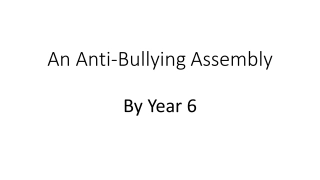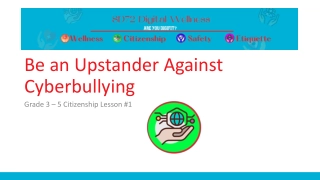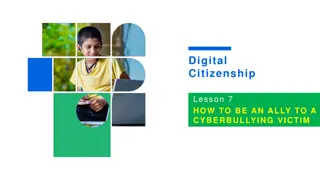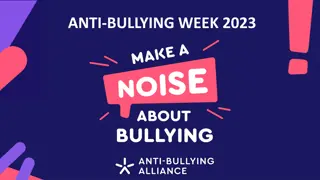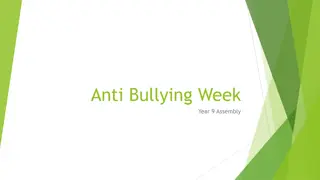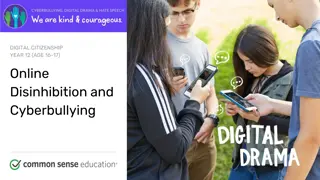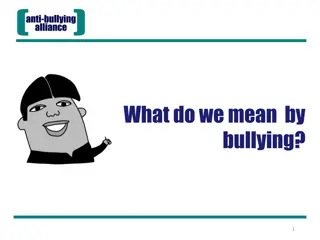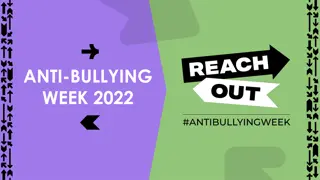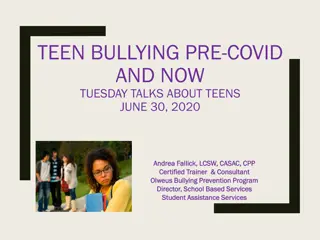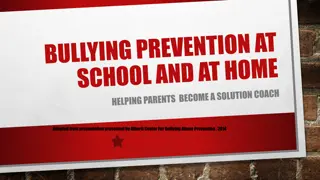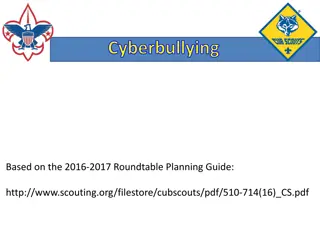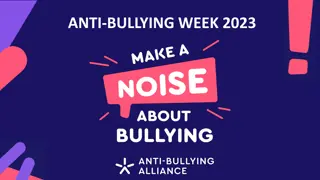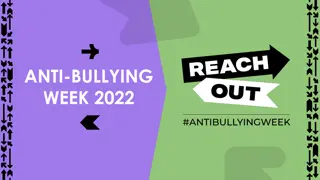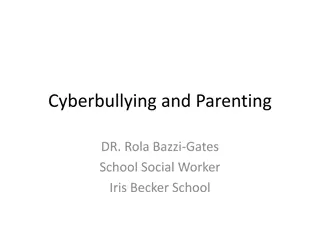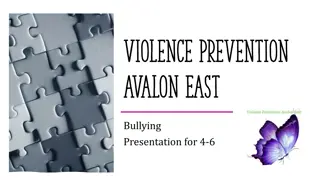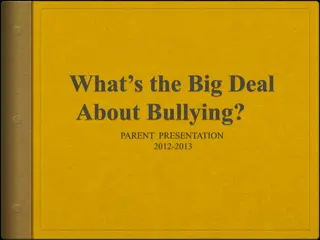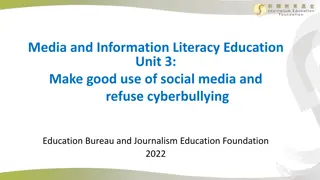BULLYING AND CYBERBULLYING
Bullying and cyberbullying are forms of unwanted, aggressive behavior that often involve a power imbalance among children. The behavior can be repeated over time and lead to serious, lasting issues for both the victims and perpetrators. Types of bullying include verbal, social, and physical actions, each with harmful effects on the victims' well-being. Bullying can occur in various settings, requiring awareness and intervention to address the underlying causes and prevent its negative impacts.
Download Presentation

Please find below an Image/Link to download the presentation.
The content on the website is provided AS IS for your information and personal use only. It may not be sold, licensed, or shared on other websites without obtaining consent from the author.If you encounter any issues during the download, it is possible that the publisher has removed the file from their server.
You are allowed to download the files provided on this website for personal or commercial use, subject to the condition that they are used lawfully. All files are the property of their respective owners.
The content on the website is provided AS IS for your information and personal use only. It may not be sold, licensed, or shared on other websites without obtaining consent from the author.
E N D
Presentation Transcript
WHAT IS BULLYING?? Bullying is unwanted, aggressive behavior among school aged children that involves a real or perceived power imbalance. The behavior is repeated, or has the potential to be repeated, over time. Both kids who are bullied and who bully others may have serious, lasting problems.
WHAT IS BULLYING?? In order to be considered bullying, the behavior must be aggressive and include: An Imbalance of Power: Kids who bully use their power such as physical strength, access to embarrassing information, or popularity to control or harm others. Power imbalances can change over time and in different situations, even if they involve the same people. Repetition: Bullying behaviors happen more than once or have the potential to happen more than once. Bullying includes actions such as making threats, spreading rumors, attacking someone physically or verbally, and excluding someone from a group on purpose.
TYPES OF BULLYING There are three types of bullying: Verbal bullying is saying or writing mean things. Verbal bullying includes: Teasing Name-calling Inappropriate sexual comments Taunting Threatening to cause harm
TYPES OF BULLYING Social bullying, sometimes referred to as relational bullying, involves hurting someone s reputation or relationships. Social bullying includes: Leaving someone out on purpose Telling other children not to be friends with someone Spreading rumors about someone Embarrassing someone in public
TYPES OF BULLYNG Physical bullying involves hurting a person s body or possessions. Physical bullying includes: Hitting/kicking/pinching Spitting Taking or breaking someone s things Making mean or rude hand gestures Tripping/pushing
WHERE AND WHEN BULLYING HAPPENS Bullying can occur during or after school hours. While most reported bullying happens in the school building, a significant percentage also happens in places like on the playground or the bus. It can also happen travelling to or from school, in the youth s neighborhood, or on the Internet.
WHY DO PEOPLE BULLY?? To understand the answer to this you have to step inside the mind of a bully. You have to look at their past and why they ve become the person that they are. Bullies, like most people, can change their ways. Here are 9 reasons for bullying.
REASONS FOR BULLYING 1) THE BULLY HAS BEEN BULLIED BEFORE Many bullies have been bullied before, whether by family or just by their peers. They may have been teased to a point where they feel insignificant, which makes them so angry that they have to take it out on someone else. Especially if it happened to them in their childhood years, they could grow up with a bully mentality because it s all they know. Of course, this goes both ways as someone who has been bullied before can turn out to be a great person.
REASONS FOR BULLYING 2) THE BULLY IS LONELY Feeling unimportant and left out can contribute to bullying. Everyone needs attention and sometimes, those who don t have enough will turn into bullies. It s what they feel gives them power and a sense of importance. Even if they have many friends, they may still crave the attention they feel they deserve but are not getting.
REASONS FOR BULLYING 3) THE BULLY HAS PROBLEMS AT HOME It s common for a bully to have had problems at home. This could be physical or verbal abuse that will affect someone s mind. That could turn a normal person into an aggressive and emotional being with a fragile mind. You have to understand that if this is the case, then the bully is a victim too.
REASONS FOR BULLYING 4) THE BULLY HAS LOW SELF-ESTEEM If someone feels that they re not smart enough, attractive enough or worthy enough, then they have to make themselves feel better about themselves. Whatever the reason is, the easiest way for them to achieve that is by putting someone else down. However, they ll find out sooner or later that it s a losing strategy because someone will fight back. Unfortunately, they will probably just go back to finding a weaker person to pick on.
REASONS FOR BULLYING 5) THE BULLY IS JEALOUS This ties in with the previous reason of the bully having low self-esteem. However, if a bully is jealous of a particular person then they ll take their frustrations out on that person. The main reason for jealously is often popularity. The victim could be more popular than the bully which truly gets on their nerves.
REASONS FOR BULLYING 6) THE BULLY IS PART OF A PACK More often than not, bullies roll in groups. They want a sense of security just in case someone decides to fight back, then they can call for back up. Usually, if they were alone, this reduces their confidence and they will wait until they feel safe.
REASONS FOR BULLYING 7) THE BULLY HAS A BIG EGO Some bullies don t fit any of the above criteria. Their main motivation for bullying simply boils down to having a big ego. Their arrogance has made themselves believe that they re the best thing since sliced bread. Until someone challenges them on this, they ll continue to have the same frame of mind.
REASONS FOR BULLYING 8) THE BULLY LIKES TO IMPRESS Certain people want to be the center of attention. We all know someone like that. There s nothing wrong with that but a bully chooses to get that attention in the wrong way. They usually don t have any particular talent or skills that can impress people so they have to poke fun at someone to get some laughs. Because of this, they feel that they ve left a good impression among their peers.
REASONS FOR BULLYING 9) THE BULLY SEES YOU AS BEING DIFFERENT A bully will pick out their target based on a specific reason. You could be different in some way, whether it s by race, sexuality, disability or something else. They will single you out and verbally and/or physically abuse you. Usually, they won t let you know the reason but most of the time it s obvious.
HOW DOES IT FEEL TO BE BULLIED? Fear. Imagine waking up in the morning knowing you will be facing one of your worst fears. It s like someone who is afraid of heights knowing they are going to be standing on top of a tall building that day. For people who are bullied every day, they are waking up knowing they are going to be encountering their bully (or bullies). They wonder, What will this person do or say to me today that will make me feel awful? Fear is not a fun feeling to have. When we are afraid, we feel threatened. We feel unsafe. As a result, our mind and body are in constant alert, and it is exhausting. Nobody wants to feel that way ever, let alone on a daily basis, in a place where they should feel secure such as a classroom or school bus.
HOW DOES IT FEEL TO BE BULLIED? Low self-confidence. Both physical and emotional bullying are meant to intimidate and demean another person. It can make that person feel weak and inferior, especially if the harassment is continuous. If another person tries to assert power over another in such a way, the potential impact on self-esteem is understandable. Remember that strength and power are subjective. Things like physical strength, popularity or financial status are not metrics for who is better than another. Always remember that you are incredible and extraordinary for who you are, and no other person should make you feel like you are not.
HOW DOES IT FEEL TO BE BULLIED? Hopelessness. Sometimes victims feel like there is nothing they can do to stop the bullying. Even if this isn t true, they may be afraid of the repercussions, like angering the bully more or bringing too much attention on themselves. They don t want to make a big deal out of it. The trouble is, these concerns may stop them from doing something to stop the behavior, like telling a parent or guardian, a teacher or the principal. It may be difficult to do. You might be afraid. You might be worried about the consequences . But as long as the bully thinks he can get away with it, he/she is not likely to stop. Try to realize that as long as the harassment continues, you will keep feeling all of the other things in this list.
HOW DOES IT FEEL TO BE BULLIED? Anger. Perhaps the most understandable feeling out of everything is anger. When a victim is being bullied, it is natural for them to feel at least a little bit of anger. The fact that someone is intentionally trying to cause you pain, whether physical or emotional, is a legitimate reason to feel angry. The trick is to control the anger instead of letting it control you. Remember that any words or actions used against you are only a reflection of the person delivering them.
HOW DOES IT FEEL TO BE BULLIED? Humiliation. Embarrassment is quite an unpleasant thing to feel. The feeling of shame can really weigh you down and hang over your head like a storm cloud. But you have nothing to be embarrassed about. Be proud of who you are and practice habits of happiness and self- confidence. Do not worry about how others perceive you and you will relieve a great deal of stress. It s very liberating when you can just be who you are and take pride in it.
HOW DOES IT FEEL TO BE BULLIED? Sadness. Depression, along with humiliation, are the emotions that tend to lead to suicide in bullying situations. The constant fear, embarrassment, and belittling can wear a person down until they feel trapped in despair. Victims of suicide feel that they will never be free of such awful feelings, which makes it all the more tragic because they can be free of them. With supportive and caring people at their side and a strong will to prevail, anyone can come out of even the deepest depression.
HOW DOES IT FEEL TO BE BULLIED? So, the answer to the question in the title is It certainly doesn t feel good to be bullied. But there is always hope, especially if you have strong will, courage, emotional strength, and a positive support system to help you through it.
HOW THE WITNESS FEEL IN A BULLYING SITUATION Students who witnessed acts of bullying were more likely to report greater psychological distress than those students who were bullies or victims, according to the results. This was the case even for students who had not been victims themselves, although being both a witness and a victim did also significantly predict mental health problems. It is possible that those students who had been victimized at different times may be experiencing it all over again psychologically, said Rivers. Meanwhile, those who are witnesses may worry that they, too, will be the bully s target sometime in the future and that causes great distress and anxiety. Previous research has shown that students who witness acts of bullying, but are not directly involved, feel guilty for not interceding on the victim s behalf, which may help explain the higher levels of mental distress.
BULLYING: How to handle it So now you know that bullying is a big problem that affects a lot of kids, but what do you do if someone is bullying you? Our advice falls into two categories: preventing a run-in with the bully, and what to do if you end up face-to-face with the bully.
Reventing a Run-In With a Bully Don't give the bully a chance. As much as you can, avoid the bully. You can't go into hiding or skip class, of course. But if you can take a different route and avoid the mean kid, do so. Stand tall and be brave. When you're scared of another person, you're probably not feeling your bravest. But sometimes just acting brave is enough to stop a bully. How does a brave person look and act? Stand tall and you'll send the message: "Don't mess with me." It's easier to feel brave when you feel good about yourself. See the next tip! Feel good about you. Nobody's perfect, but what can you do to look and feel your best? Maybe you'd like to be more fit. If so, maybe you'll decide to get more exercise, watch less TV, and eat healthier snacks. Or maybe you feel you look best when you shower in the morning before school. If so, you could decide to get up a little earlier so you can be clean and refreshed for the school day. Get a buddy (and be a buddy). Two is better than one if you're trying to avoid being bullied. Make a plan to walk with a friend or two on the way to school, recess, lunch, or wherever you think you might meet the bully. Offer to do the same if a friend is having bully trouble. Get involved if you see bullying going on in your school tell an adult, stick up for the kid being bullied, and tell the bully to stop.
If The Bully Says or Does Something to You Ignore the bully. If you can, try your best to ignore the bully's threats. Pretend you don't hear them and walk away quickly to a place of safety. Bullies want a big reaction to their teasing and meanness. Acting as if you don't notice and don't care is like giving no reaction at all, and this just might stop a bully's behavior. Stand up for yourself. Pretend to feel really brave and confident. Tell the bully "No! Stop it!" in a loud voice. Then walk away, or run if you have to. Kids also can stand up for each other by telling a bully to stop teasing or scaring someone else, and then walking away together. If a bully wants you to do something that you don't want to do, say "no!" and walk away. If you do what a bully says to do, the mean kid is more likely to keep bullying you. Bullies tend to pick on kids who don't stick up for themselves. Don't bully back. Don't hit, kick, or push back to deal with someone bullying you or your friends. Fighting back just satisfies a bully and it's dangerous, too, because someone could get hurt. You're also likely to get in trouble. It's best to stay with others, stay safe, and get help from an adult. Don't show your feelings. Plan ahead. How can you stop yourself from getting angry or showing you're upset? Try distracting yourself (counting backwards from 100, spelling the word 'turtle' backwards, etc.) to keep your mind occupied until you are out of the situation and somewhere safe where you can show your feelings. Tell an adult. If you are being bullied, it's very important to tell an adult. Find someone you trust and talk about what is happening to you. Teachers, principals, parents, and lunchroom helpers at school can all help to stop bullying. Sometimes bullies stop as soon as a teacher finds out because they're afraid that they will be punished by parents. This is not tattling on someone who has done something small bullying is wrong and it helps if everyone who gets bullied or sees someone being bullied speaks up.
CYBERBULLYING Cyberbullying is bullying that takes place over digital devices like cell phones, computers, and tablets. Cyberbullying can occur through SMS, Text, and apps, or online in social media, forums, or gaming where people can view, participate in, or share content. Cyberbullying includes sending, posting, or sharing negative, harmful, false, or mean content about someone else. It can include sharing personal or private information about someone else causing embarrassment or humiliation. Some cyberbullying crosses the line into unlawful or criminal behavior. The most common places where cyberbullying occurs are: Social Media, such as Facebook, Instagram, Snapchat, and Twitter SMS (Short Message Service) also known as Text Message sent through devices Instant Message (via devices, email provider services, apps, and social media messaging features) Email
CYBERBULLYING Special Concerns With the prevalence of social media and digital forums, comments, photos, posts, and content shared by individuals can often be viewed by strangers as well as acquaintances. The content an individual shares online both their personal content as well as any negative, mean, or hurtful content creates a kind of permanent public record of their views, activities, and behavior. This public record can be thought of as an online reputation, which may be accessible to schools, employers, colleges, clubs, and others who may be researching an individual now or in the future. Cyberbullying can harm the online reputations of everyone involved not just the person being bullied, but those doing the bullying or participating in it. Cyberbullying has unique concerns in that it can be: Persistent Digital devices offer an ability to immediately and continuously communicate 24 hours a day, so it can be difficult for children experiencing cyberbullying to find relief. Permanent Most information communicated electronically is permanent and public, if not reported and removed. A negative online reputation, including for those who bully, can impact college admissions, employment, and other areas of life. Hard to Notice Because teachers and parents may not overhear or see cyberbullying taking place, it is
CYBERBULLYING Laws and Sanctions Although all states have laws requiring schools to respond to bullying, many states do not include cyberbullying under these laws or specify the role schools should play in responding to bullying that takes place outside of school. Schools may take action either as required by law, or with local or school policies that allow them to discipline or take other action. Some states also have provisions to address bullying if it affects school performance. You can learn about the laws and policies in each state, including if they cover cyberbullying.


